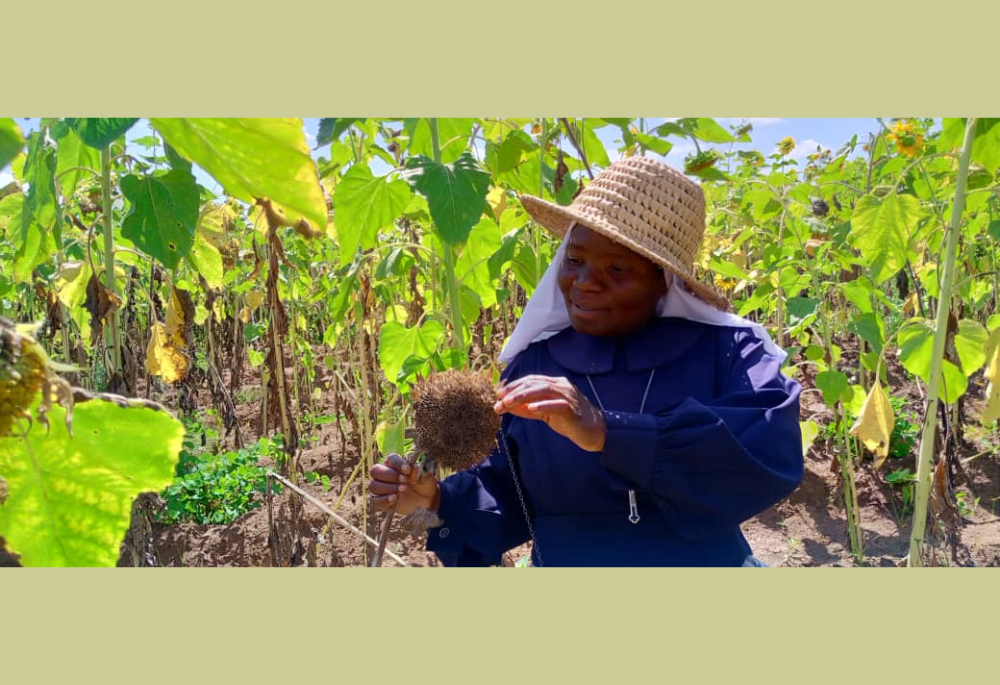
Sr. Nancy Tadala of the Presentation of the Blessed Virgin Mary inspects the sisters' field of sunflowers at their regional house in Nsiyaludzu village in Balaka district, Malawi, Africa. (Courtesy of Nancy Tadala)
It is never too late to learn new things. God's time is always the best for us, and God does not make mistakes. I rejoice that my heart, mind and eyes opened as I listened to a program on congregational sustainability by Roy Okonji a few weeks ago. It was especially important because I have a degree in accounting and much farming experience from my parents, which helps me in my agriculture work in the congregation. Learning new things about sustainability was very exciting.
I had always thought sustainability was only important for the environment, which positively impacts climate change. I learned that sustainability is at the heart of all life, people, earth and even profit. Conserving the environment is one aspect of living sustainably, and another is the need to live on good terms with people and the earth, and not causing harm to God's creation. Thinking about sustainability of profits is also new, and possible when we use power, time and material efficiently.
Our presenter Okonji shed new light on these concepts in a two-day workshop on congregational sustainability. He spoke first about sustainability of relationships in communities or teams, giving examples of how negative ways of relating might be a kind of killing of one another, psychologically or spiritually.
I had never thought about how negative behaviors and attitudes in congregational politics or governance can work against sustainable futures. He gave examples of structures like one-man projects or attitudes about being the best always, when some sisters act like they always know it all, which can promote double standards and discrimination. This leads to unhealthy self-interest and puts "me" first in decision-making.
Okonji also spoke about sustaining profitability in our projects. He emphasized the importance of good project planning, suggesting it is better to focus on limiting projects, rather than having many that are not strong. Self-interest, attitudes of "I know it all" or "I should be in charge," competition, or unwillingness to support our peers' pioneering creativity can at times be the cause of starting too many projects at once. Okonji cautioned us to examine our reasons for resistance, and instead think about what is best for our congregations and the environment.

Sr. Nancy Tadala of the Presentation of the Blessed Virgin Mary inspects the sisters' field of sunflowers at their regional house in Nsiyaludzu village in Balaka district, Malawi, Africa. (Courtesy of Nancy Tadala)
He also spoke about project management, and searching for local resources and vital finances. I had never thought about taking an inventory of assets or how to do it, and this is essential to future sustainability of projects. Sometimes it seems easier to look outside for donors or materials, neglecting assets right in front of us. Using local resources usually requires fewer materials and offers a more efficient use of time.
Financing projects is always a challenge in our province because capital is needed. So, when a sister in the program spoke about borrowing funds, my ears opened to this new idea. However, Okonji reminded us that borrowing is also a risk because loans must be paid back, ordinarily with interest, which adds to the project cost.
He suggested three important points to keep in mind. One is for potential borrowers to have clear and detailed reasons for taking out loans; two is knowing and understanding the specific rules required by the loaner; and three is making sure that there is a reasonable repayment rate and plan in place.
Advertisement
To be ignorant or careless about requirements and expectations can ruin the reputation of our congregations and make it impossible to engage in future borrowing. Loans are only one way to seek capital; donors are still needed. The same rule applies: follow all the requirements in submitting a simple, concise and clear project.
All financial arrangements, whether with donations or loans, require transparency and accountability in order to sustain success. Everyone involved is entitled to the same accurate information. Having these arrangements builds trust and enables the donor or loaner to offer good advice and assistance. Accountability calls for honest communication and reporting about project' progress, along with how funds are being spent according to original, mutually agreed upon plans, and seeking permission when changes in the plan are needed.
Plan, plan, plan for financial stability. Having finance teams to provide internal and external transparency and accountability is a good practice. Their tasks include budgeting, monitoring, documenting and producing reports on funds management. They keep track of cash flows so that bills are paid on time, cash reserves discounts are noted and applied when possible, and bulk purchasing is considered.
Not having these skills and structures in place can be a grave risk for congregations. Not having them also adds to the stress of those in administration and governance of the congregation. If there are no sisters trained in finance, no treasurers or project managers, hire finance consultants to assist the congregation. Without such assistance, the congregation is financially vulnerable.

Sr. Nancy Tadala tends to their herd of pigs at their regional house in Nsiyaludzu village in Balaka district, Malawi, Africa. (Courtesy of Nancy Tadala)
Listening to these two days of information, I felt grateful. Since I am working in the agriculture ministry of my congregation, this training has enlightened and enkindled my energies to work. Throughout the days, I was mentally applying what was said to our projects, like expanding our pig project and managing our various agriculture pursuits — maize, beans, bananas and sugar cane for internal use and income generation — and our newest project, extracting oil from sunflower and groundnuts, for both use and sale.
The talks also inspired me and gave me valuable insight into the "big picture" of how small projects fit into the whole and how often we sisters in community are ignorant of our individual responsibilities to learn skills to manage whatever project or ministry we are assigned.
This could begin early, by providing sisters in formation with training in financial literacy and sustainability. Doing so will help create reliable and sustainable congregations, since sisters will have knowledge on how to care for the earth and their own communities in the early stages of religious life.
Learning about sustainability has been enlightening and inspiring. By planning well, using local resources and being transparent, we can ensure our projects and congregations thrive. Learning these practices early in our religious life will help us care for the earth and each other, building a strong and sustainable future together.








